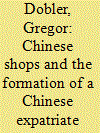| Srl | Item |
| 1 |
ID:
095351


|
|
|
|
|
| Publication |
2009.
|
| Summary/Abstract |
The first Chinese migrants came to the Namibian border boom town Oshikango in 1999. Today, there are over 100 shops which sell Chinese goods to Angolan traders in that town of only around 10,000 inhabitants. This article describes their way of doing business and the economic interactions between migrants and the host society. By reacting to the host society's reaction to them, Chinese shopkeepers in Namibia are gradually developing into a migrant society with a distinct social structure. In an increasingly hostile political climate, Chinese entrepreneurs are faced with stronger regulation. This has not had the intended effect of pushing shopkeepers into manufacturing. Instead, it has sharpened social stratification among migrants, with traders better connected to Namibian authorities using their connections as an additional resource. In an optimistic view, the alliance between successful Chinese and Namibian actors could be the germ for a spill-over of Chinese entrepreneurial success; in a pessimistic view, it will create additional rents for some Namibians and give migrants the leverage to evade regulations.
|
|
|
|
|
|
|
|
|
|
|
|
|
|
|
|
| 2 |
ID:
145960


|
|
|
|
|
| Summary/Abstract |
What are the reasons for the extraordinary dynamism of many African border regions? Are there specificities to African borderlands? The article provides answers to these questions by analysing the historical development of African state borders’ social and economic relevance. It presents a typology of cross-border trade in Africa, differentiating trade across the ‘green’ border of bush paths and villages, the ‘grey’ border of roads, railways and border towns, and the ‘blue’ border of transport corridors to oceans and airports. The three groups of actors associated with these types of trade have competing visions of the ideal border regime, to which many dynamics in African cross-border politics can be traced back. The article contributes to African studies by analysing diverging political and economic developments in African countries through the lens of the border, and to border theory by distilling general features of borders and borderlands from African case studies.
|
|
|
|
|
|
|
|
|
|
|
|
|
|
|
|
| 3 |
ID:
167527


|
|
|
|
|
| Summary/Abstract |
Switzerland is usually not looked upon as a substantial economic actor in Africa. Taking Zambian copper as a case study, we show how important Swiss companies have become in the global commodities trade and the services it depends on. While big Swiss trading firms such as Glencore and Trafigura have generated increasing scholarly and public interest, a multitude of Swiss companies is involved in logistics and transport of Zambian copper. Swiss extractivism, we argue, is a model case for trends in today's global capitalism. We highlight that servicification, a crucial element of African mining regimes today, creates new and more flexible opportunities for international companies to capture value in global production networks. These opportunities partly rely on business-friendly regulation and tax regimes in Northern countries, a fact which makes companies potentially vulnerable to reputation risks and offers opportunities to civil society actors criticising their role. New and different Swiss–Zambian connections emerge from civil society networks organising around companies’ economic activities.
|
|
|
|
|
|
|
|
|
|
|
|
|
|
|
|